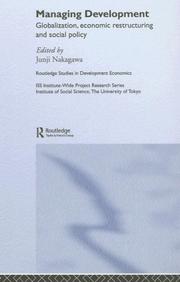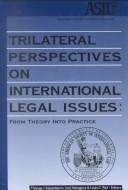| Listing 1 - 10 of 17 | << page >> |
Sort by
|
Book
ISBN: 0191731676 9780191731679 Year: 2011 Publisher: Oxford : Oxford University Press,
Abstract | Keywords | Export | Availability | Bookmark
 Loading...
Loading...Choose an application
- Reference Manager
- EndNote
- RefWorks (Direct export to RefWorks)
With the advancing globalization of the world economy, domestic economic regulations are becoming more and more subject to efforts at international harmonization. This book presents an analysis of this worldwide phenomenon from both a legal and a politico-economic perspective.
International trade --- Foreign trade regulation --- International economic relations --- International cooperation --- Law, Politics & Government --- Law, General & Comparative --- International unification --- Law and legislation --- Cooperation, International --- Global governance --- Institutions, International --- Interdependence of nations --- International institutions --- World order --- Cooperation --- International relations --- International organization --- Export and import controls --- Foreign trade control --- Import and export controls --- International trade control --- International trade regulation --- Prohibited exports and imports --- Trade regulation --- Economic policy, Foreign --- Economic relations, Foreign --- Economics, International --- Foreign economic policy --- Foreign economic relations --- International economic policy --- International economics --- New international economic order --- Economic policy --- Economic sanctions --- External trade --- Foreign commerce --- Foreign trade --- Global commerce --- Global trade --- Trade, International --- World trade --- Commerce --- Non-traded goods --- Foreign trade regulation. --- International economic relations. --- International cooperation. --- International unification.

ISBN: 0415364108 0415649870 9786610518067 113422558X 1280518065 0203015290 1134225571 Year: 2006 Publisher: London Routledge
Abstract | Keywords | Export | Availability | Bookmark
 Loading...
Loading...Choose an application
- Reference Manager
- EndNote
- RefWorks (Direct export to RefWorks)
Globalization in the 1990s provided both opportunities and challenges for developing and transition economies. Though for some, it offered the chance to achieve economic growth through active involvement in the integrated and liberalized world economy, it also increased their vulnerability to external shocks and volatility.As a consequence, stakeholders at every level of the development and transition process - international organizations, national governments and the private sector - had to review their strategies in order to adjust to the new world economic environment. As t
Social policy --- International finance --- International economic relations --- Developing countries --- Globalization --- Financial crises --- Economic aspects. --- Social policy. --- Emerging nations --- Fourth World --- Global South --- LDC's --- Least developed countries --- Less developed countries --- Newly industrialized countries --- Newly industrializing countries --- NICs (Newly industrialized countries) --- Third World --- Underdeveloped areas --- Underdeveloped countries --- latin --- america --- transition --- economies --- east --- asian --- countries --- developing --- country --- world
Book
ISBN: 9780415528733 9780203077269 Year: 2013 Publisher: London ; New York : Routledge,
Abstract | Keywords | Export | Availability | Bookmark
 Loading...
Loading...Choose an application
- Reference Manager
- EndNote
- RefWorks (Direct export to RefWorks)
Book
ISBN: 1134225539 Year: 2006 Publisher: Taylor & Francis
Abstract | Keywords | Export | Availability | Bookmark
 Loading...
Loading...Choose an application
- Reference Manager
- EndNote
- RefWorks (Direct export to RefWorks)
Book
Year: 2006 Publisher: London ; New York, New York : Taylor & Francis,
Abstract | Keywords | Export | Availability | Bookmark
 Loading...
Loading...Choose an application
- Reference Manager
- EndNote
- RefWorks (Direct export to RefWorks)
Globalization in the 1990s provided both opportunities and challenges for developing and transition economies. Though for some, it offered the chance to achieve economic growth through active involvement in the integrated and liberalized world economy, it also increased their vulnerability to external shocks and volatility. As a consequence, stakeholders at every level of the development and transition process - international organizations, national governments and the private sector - had to review their strategies in order to adjust to the new world economic environment. As the Mexican peso crisis of 1994-1995 and the Asian financial crisis of 1997-1998 showed dramatically, the cost of maladjustment was not only very high but it also affected many more stakeholders than before, due to the contagious effects of crises. This revealing book analyzes the different methods employed to manage globalization and development. Bringing together an international team of contributors, including Barbara Stallings, Alicia Giron and J. C. Ferraz, it will prove to be a valuable resource for those involved in the fields of development economics and political economy.
Globalization --- Financial crises --- Economic aspects. --- Developing countries --- Social policy.
Book
Year: 2006 Publisher: London ; New York, New York : Taylor & Francis,
Abstract | Keywords | Export | Availability | Bookmark
 Loading...
Loading...Choose an application
- Reference Manager
- EndNote
- RefWorks (Direct export to RefWorks)
Globalization in the 1990s provided both opportunities and challenges for developing and transition economies. Though for some, it offered the chance to achieve economic growth through active involvement in the integrated and liberalized world economy, it also increased their vulnerability to external shocks and volatility. As a consequence, stakeholders at every level of the development and transition process - international organizations, national governments and the private sector - had to review their strategies in order to adjust to the new world economic environment. As the Mexican peso crisis of 1994-1995 and the Asian financial crisis of 1997-1998 showed dramatically, the cost of maladjustment was not only very high but it also affected many more stakeholders than before, due to the contagious effects of crises. This revealing book analyzes the different methods employed to manage globalization and development. Bringing together an international team of contributors, including Barbara Stallings, Alicia Giron and J. C. Ferraz, it will prove to be a valuable resource for those involved in the fields of development economics and political economy.
Globalization --- Financial crises --- Economic aspects. --- Developing countries --- Social policy.
Book
Year: 2006 Publisher: London ; New York, New York : Taylor & Francis,
Abstract | Keywords | Export | Availability | Bookmark
 Loading...
Loading...Choose an application
- Reference Manager
- EndNote
- RefWorks (Direct export to RefWorks)
Globalization in the 1990s provided both opportunities and challenges for developing and transition economies. Though for some, it offered the chance to achieve economic growth through active involvement in the integrated and liberalized world economy, it also increased their vulnerability to external shocks and volatility. As a consequence, stakeholders at every level of the development and transition process - international organizations, national governments and the private sector - had to review their strategies in order to adjust to the new world economic environment. As the Mexican peso crisis of 1994-1995 and the Asian financial crisis of 1997-1998 showed dramatically, the cost of maladjustment was not only very high but it also affected many more stakeholders than before, due to the contagious effects of crises. This revealing book analyzes the different methods employed to manage globalization and development. Bringing together an international team of contributors, including Barbara Stallings, Alicia Giron and J. C. Ferraz, it will prove to be a valuable resource for those involved in the fields of development economics and political economy.
Globalization --- Financial crises --- Economic aspects. --- Developing countries --- Social policy.
Book
ISBN: 9780199604661 0199604665 Year: 2011 Publisher: Oxford Oxford University Press
Abstract | Keywords | Export | Availability | Bookmark
 Loading...
Loading...Choose an application
- Reference Manager
- EndNote
- RefWorks (Direct export to RefWorks)
International trade --- Foreign trade regulation --- International economic relations --- International cooperation --- Commerce international --- Commerce extérieur --- Relations économiques internationales --- Coopération internationale --- International unification --- Réglementation --- Unification internationale --- International cooperation. --- International economic relations. --- International trade. --- International unification. --- Law and legislation. --- Commerce extérieur --- Relations économiques internationales --- Coopération internationale --- Réglementation

ISBN: 1571050779 Year: 1996 Publisher: Dobbs Ferry (N.Y.) : Transnational publishers,
Abstract | Keywords | Export | Availability | Bookmark
 Loading...
Loading...Choose an application
- Reference Manager
- EndNote
- RefWorks (Direct export to RefWorks)
Arms control --- Foreign trade regulation --- Human rights --- International law --- Congresses.
Book
ISBN: 9811502552 9811502544 Year: 2020 Publisher: Singapore : Springer Singapore : Imprint: Springer,
Abstract | Keywords | Export | Availability | Bookmark
 Loading...
Loading...Choose an application
- Reference Manager
- EndNote
- RefWorks (Direct export to RefWorks)
This is the first book that critically examines the reform of the Appellate Body (AB) of the World Trade Organization (WTO) in light of the current crisis resulting from the U.S. blocking of the appointment of its members. The reform of the AB is critical, as the appointment crisis could lead to the demise of “the jewel in the crown,” which may even cause the dismantling of the WTO as a whole. This book covers various aspects of the crisis and its reform. Specifically, as the crisis cannot be fully understood without reviewing the role of the AB from the broader perspectives of the other functions of the WTO, the book examines the reform of the AB from the broader perspectives of the WTO governance. Additional focus is on the reform of the AB in relation to its specific functions. Available options are provided to address the AB crisis, as well as discussion of wider implications beyond the WTO. Contributed by world-renowned academics, experts, and practitioners in the field of international economic law, this volume provides a comprehensive analysis of the AB crisis and its solutions.
World Trade Organization. --- International law. --- Trade. --- Mediation. --- Dispute resolution (Law). --- Conflict management. --- International environmental law. --- International Economic Law, Trade Law. --- Dispute Resolution, Mediation, Arbitration. --- Sources and Subjects of International Law, International Organizations. --- International Environmental Law. --- International environmental law --- International law --- Common heritage of mankind (International law) --- Conflict control --- Conflict resolution --- Dispute settlement --- Management of conflict --- Managing conflict --- Management --- Negotiation --- Problem solving --- Social conflict --- Crisis management --- ADR (Dispute resolution) --- Alternative dispute resolution --- Appropriate dispute resolution --- Collaborative law --- Dispute processing --- Justice, Administration of --- Mediation --- Neighborhood justice centers --- Third parties (Law) --- Good offices (Mediation) --- Conflict management --- Dispute resolution (Law) --- Law of nations --- Nations, Law of --- Public international law --- Law --- Law and legislation --- Environmental law, International.
| Listing 1 - 10 of 17 | << page >> |
Sort by
|

 Search
Search Feedback
Feedback About UniCat
About UniCat  Help
Help News
News